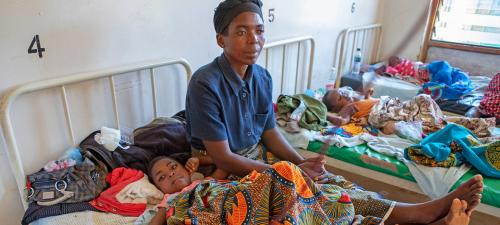‘Zero malaria starts with me’ UN health agency urges grassroots responsibility on World Day
After more than a decade of steady advances in fighting malaria, progress has leveled off, which is why this World Malaria Day, the World Health Organization (WHO) is supporting a grassroots campaign to emphasize country ownership and community empowerment to improve malaria prevention and care.

A woman cares for her child who has malaria at a hospital in Malawi (April 2019)
“Every two minutes a child dies from this preventable and treatable disease”, said WHO Director-General Tedros Adhanom Ghebreyesus.
Malaria is a life-threatening disease caused by parasites that are transmitted to people through the bites of infected female mosquitoes. According to the UN health agency’s latest World Malaria Report, the estimated number of malaria cases remained virtually unchanged from 2015 to 2017.
Moreover, there are approximately 219 million cases globally and an estimated 435,000 deaths.
In his video message, the WHO chief said the campaign “Zero malaria starts with me”, calls on political leaders, the private sector and affected communities to take action to improve prevention, diagnosis and treatment, stressing: “We all have a role to play”.
Commemorated every 25 April, World Malaria Day highlights the need for sustained investment and political commitment for malaria prevention, control and elimination.
An ominous numbers game
Tracking data and trends, the goal of WHO’s Global Technical Strategy to reduce malaria cases and deaths by at least 40 per cent by 2020 is off track.
Funding for the 2017 global malaria response remained largely unchanged from the previous year, which at $3.1 billion for malaria control and elimination programmes, is well below the $6.6 billion funding target for 2020.
According to the latest World malaria report, major coverage gaps have limited access to core WHO-recommended tools for preventing, detecting and treating the disease.
In 2017, 50 per cent of the at-risk population in Africa slept under an insecticide-treated net, a similar figure to the previous year and a marginal improvement since 2015.
Moreover, that same year, just over 22 per cent of eligible pregnant women in Africa received the recommended three or more doses of preventive vaccine, compared with 17 per cent in 2015. And from 2015 to 2017, only 48 per cent of children on the continent with a fever were taken to a trained medical provider.
Source:United Nations
- 363 reads
Human Rights
Fostering a More Humane World: The 28th Eurasian Economic Summi

Conscience, Hope, and Action: Keys to Global Peace and Sustainability

Ringing FOWPAL’s Peace Bell for the World:Nobel Peace Prize Laureates’ Visions and Actions

Protecting the World’s Cultural Diversity for a Sustainable Future

Puppet Show I International Friendship Day 2020

